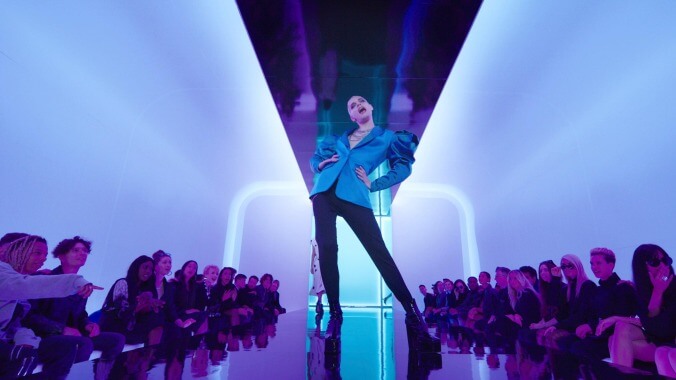Max Harwood in Everybody’s Talking About Jamie Photo: Monarchy Enterprises S.a.r.l., Regency Entertainment (USA), Inc. and Channel Four Television Corporation
Back in the ’90s and early 2000s, scrappy British characters of modest means triumphing over adversity was a globally popular subgenre, and in retrospect it’s odd that none of those movies were proper musicals—especially considering how entries like The Full Monty and Brassed Off! were already song-and/or-dance-adjacent. (The Full Monty did make its way to the stage after the success of the film, as did Kinky Boots.) The new musical Everybody’s Talking About Jamie offers a decades-late corrective to this oversight, which may be why it feels, at times, like bits of it have warped in from another time period. In some ways, the movie—based on a popular West End stage show—feels quite up to date: Jamie New (Max Harwood) is a 16-year-old from Sheffield whose mother Margaret (Sarah Lancashire) and best friend Pritti (Lauren Patel) never blanche at his out-and-proud homosexuality. The throwback elements emerge when Jamie treats his fondest desire as an area of unspeakable exoticism: He wants to be a drag queen. Specifically, he yearns to attend his upcoming prom in full drag.
Of course, people can still form insecurities about their interests even with the tacit encouragement of RuPaul, and plenty of teenagers the world over would not be particularly accepting of a peer showing up to a dance in drag. But Everybody’s Talking About Jamie never fully connects its empowering musical pep talks to those real-world complications. Sheffield, as depicted here, feels less small-minded than just plain small. Jamie has his mom, one friend, one prominent high school bully, a mostly-absent father (Ralph Ineson), and a replacement father figure/mentor in the form of former drag queen Hugo (Richard E. Grant), who conveniently runs a drag-centric clothing store (heretofore unknown to Jamie). It’s not a paltry ensemble, yet it feels that way because many of the characters barely interact with anyone besides Jamie. Their world feels sparse in a way that it probably wouldn’t on stage.
Making the characters and setting cohere is really the job of the musical numbers, and they aren’t quite up to the task. First-time director Jonathan Butterell (adapting the show he originated with writers Tom Macrae and Dan Gillespie Sells) doesn’t completely bungle his stage-to-screen transition; he seems to understand, at least, some advantages of making a movie musical. This is best realized in the new song “This Was Me,” where Hugo takes Jamie on a tour of his drag history via VHS footage. The scene is so inventive and touching that it accidentally puts the overabundance of generic cafeteria empowerment anthems to shame. The more reflective numbers are worse, composed primarily of characters looking off into the distance, shot from different angles.
Most of these musical performances are treated as Jamie’s fantasies—but that line blurs because the movie’s reality is pretty watery, too. At one point, a handful of school bullies locate Sheffield’s drag club, show up early for the evening’s entertainment, and grab a table, all so they can wait for Jamie’s tryout performance and yell insults from the otherwise enthusiastic crowd—recalling the gag in The Other Guys where Mark Wahlberg’s blustery, macho cop reveals that he’s learned to dance ballet sarcastically. Subsequently, Jamie’s drag act, which the movie has never really shown him practicing or even referring to in any meaningful way before he nails it in front of an adoring crowd, becomes the subject of production-number gossip, as rumors fly around school based on the outrageous discovery that some men wore dresses, at a nightclub that has presumably existed for some time. Again, another time or place might have made this more believable (as would have gossip spreading by means other than face-to-face interactions).
Maybe the kids are so easily distractible because not a single teenager in this movie seems to devote any thought to sex, beyond occasionally using “virgin” as an insult. Early on, Jamie explains to Pritti that this isn’t a sexual fixation; he’s talking about drag, but he could be just as easily describing his homosexuality in general. While of course it’s refreshing to see a gay character not defined exclusively by sex (or death), it’s also hard to make an effective coming-of-age movie with barely a trace of hormones. Harwood’s sweetly confident presence as Jamie feels constricted by all of the scenes where other characters tell him how brave and inspiring he is.
There are some interesting conflicts percolating around the edges of the story, like Jamie’s belief—really a desperate yet completely reasonable hope—that his father will be prouder and more accepting of his son’s differences than he appears, or the way that Jamie’s drag persona comes across as viciously cutting when removed from a performer’s context and placed into a classroom. These turn out to be brief teases in a harmless, family-friendly, and shamelessly drawn-out feel-fine musical. (Somehow, Jamie smudging some of his eyebrow paint inspires what feels like 30 minutes of screen time.) Whenever the movie seems prepared to dig a little deeper, it throws another self-actualization party in its own honor.


 Keep scrolling for more great stories from The A.V. Club.
Keep scrolling for more great stories from The A.V. Club.